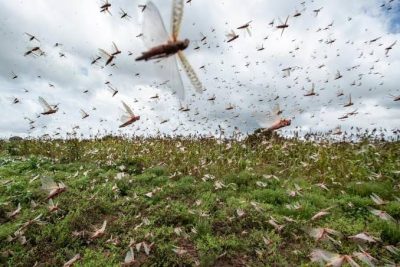
By; Our reporter
10th Feb. 2020
The infestation of Desert Locusts across vast swatches of the East African Region is one of the devastating effects of climate change that Africa has to endure, the United Nations Secretary-General Antonio Guterres has said.
The migratory pests, were first reported in parts of Somalia, Ethiopia and Kenya, have also been seen in the Ugandan districts of Amudat, Nakapiripirit and Nabilatuk, presenting an unprecedented the threat to food security and livelihoods in the region. A locust swarm of one square kilometre can eat the same amount of food in one day as 35,000 people.
The Food and Agriculture Organisation had earlier warned that Uganda and South Sudan were at high risk, as swarms moved closer .New swarms have also been reported forming in Eritrea, Saudi Arabia, Sudan and Yemen as locust infestations continue to grow on both sides of the Red Sea.
Guterres says that because the seas have become warmer, as a result of Human activity, the world is seeing more cyclones, creating a perfect breeding ground for locusts. He calls for more ambition for mitigation and, especially for Africa’s sake, more ambition on adaptation and financing to build the resilience of African countries and communities as they battle the locust invasion.
Guterres was addressing a press conference on the sidelines of the annual African Union Summit, a gathering of 55 African nations in the Ethiopian capital, Addis Ababa, last evening.
FAO has estimated that USD 76 million is needed to scale up efforts to control the rapid spread of this pest and FAO Director-General QU Dongyu has called for urgent action to combat the upsurge. So far, more than USD 18 million has been donated to the efforts to fight the upsurge.
Next:
Previous:




